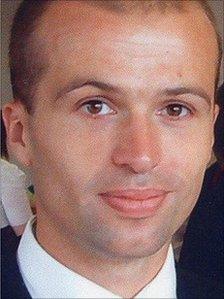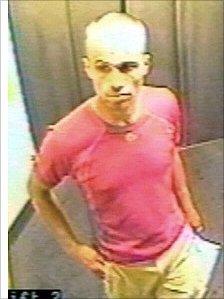Landlady found MI6 spy Gareth Williams 'tied to bed'
- Published

Gareth Williams was on secondment from GCHQ
The inquest into the death of MI6 officer Gareth Williams, whose body was found in a locked bag in his London flat on 23 August 2010, has been told he was once found tied to his bed.
His former landlady said the spy, dressed in boxer shorts, called for help when he could not untie himself.
Earlier, Det Supt Michael Broster told the coroner he did not think Mr Williams' death was linked to his work.
Mr Williams' boss at MI6 said he regretted not raising the alarm sooner.
Former intelligence agency colleagues gave evidence from behind a large blue screen, to protect their identities.
Mr Williams' line manager at MI6 - known as Witness G - told coroner Fiona Wilcox that Mr Williams' had performed some operational duties for the agency, and had never missed a day's work.
When pressed on why he did not report Mr Williams' disappearance sooner, Witness G said he thought the spy was stuck on a train: "In hindsight, knowing what I know now, should I have taken action? Absolutely."
Witness G said Mr Williams wanted to leave MI6 because he was getting bogged down in bureaucracy.
'Act of escapology'
In a statement read out earlier, Mr Williams' former landlady in Cheltenham said she once found him lying in his boxer shorts tied to his bedstead, in what she thought was a "sexually motivated" act.
Jennifer Elliot said he had shouted for help because he was unable to untie himself.
She said he claimed he wanted to see if he could free himself, but both she and her husband thought it was sexually motivated rather than an act of escapology.
He had been lying on his back with both hands and arms tied and was "very embarrassed and apologetic" after being cut free.
Speaking on Wednesday morning, Det Supt Broster, from the Metropolitan Police's counter terrorism command SO15, said he believed there was "no link this far detected" between Mr Williams's work with MI6 and his death.
Computers seized
Explaining the part SO15 played, he said officers had acted as a "conduit" between the different security services.
But he denied a suggestion that the close working relationship between his unit and the intelligence agencies amounted to "an old boys' act" which had disrupted the investigation.
SO15 carried out searches and interviews at MI6 and the government's secret listening station GCHQ, and arranged for DNA samples from Mr Williams's colleagues to be taken.
Det Supt Broster said the heads of the agencies provided the investigation with all the relevant information surrounding Mr Williams's work.
The spy's computers were seized from MI6 four days after his body was found, and then six days later from GCHQ.
Det Supt Broster told the coroner there was "no reason to suspect" evidence was interfered with at MI6 headquarters.

Police traced Mr Williams's movements via CCTV footage
"I can't say absolutely that electronic equipment seized from MI6 wasn't interfered with, but I have no reason to suspect it was."
Scotland Yard detectives have yet to determine the cause of Mr Williams's death, or establish whether he had locked himself into the bag.
On Tuesday, Det Ch Insp Jackie Sebire said she believed a third party had been involved, after "two minor components of another contributor's DNA" were found on the zip toggle and padlock.
Earlier, Elizabeth Guthrie - the second friend to appear before the coroner - said Mr Williams had used another name and called her from different telephone numbers.
'Enormous intellect'
"It was different numbers coming in and calling me that turned out to be Gareth's voice," she added.
She described her friendship with Mr Williams as based on their mutual love of history, art, Japanese Manga cartoons, travel and humorous anecdotes.
Speaking of Mr Williams's character, Ms Guthrie said he had "a brilliant sense of humour" and "an enormous intellect".
About £20,000 worth of women's designer clothing and shoes were found in the flat.
Ms Guthrie told the inquest the clothing "certainly would not be for him", that he had no interest in cross-dressing and she believed he was "straight".
Mr Williams's sister, Ceri Subbe, told the inquest on Monday that she believed the items of women's clothing were possibly intended as gifts.
In another written statement, a worker from west London fashion store Dover Street Market remembered him coming in regularly to buy women's items he said were for his girlfriend.
Carol Kirton said he had never mentioned his girlfriend's name and "he was different from other male customers".
- Published24 April 2012
- Published23 April 2012
- Published8 May 2012